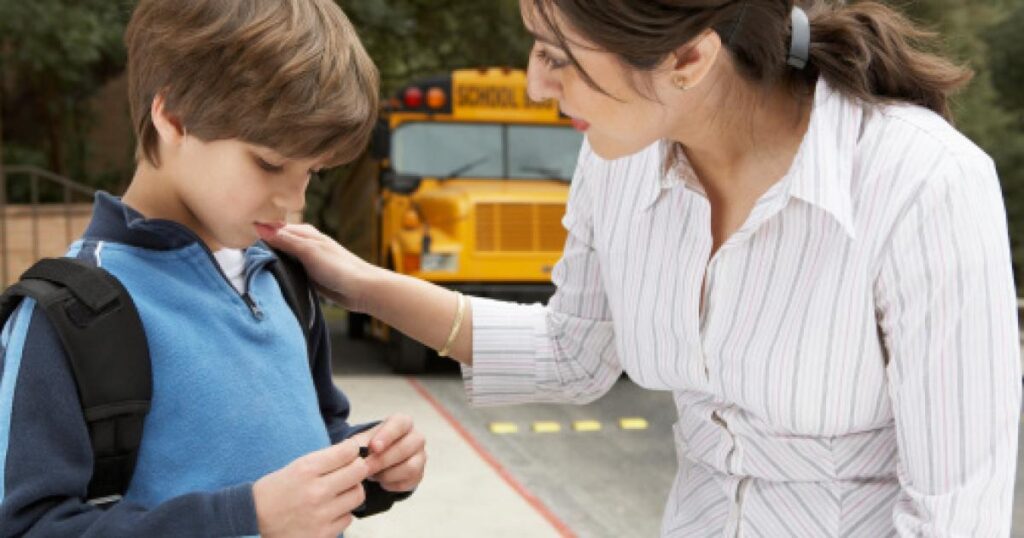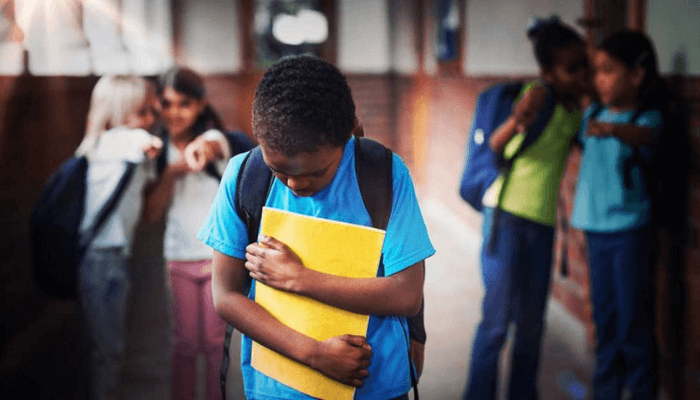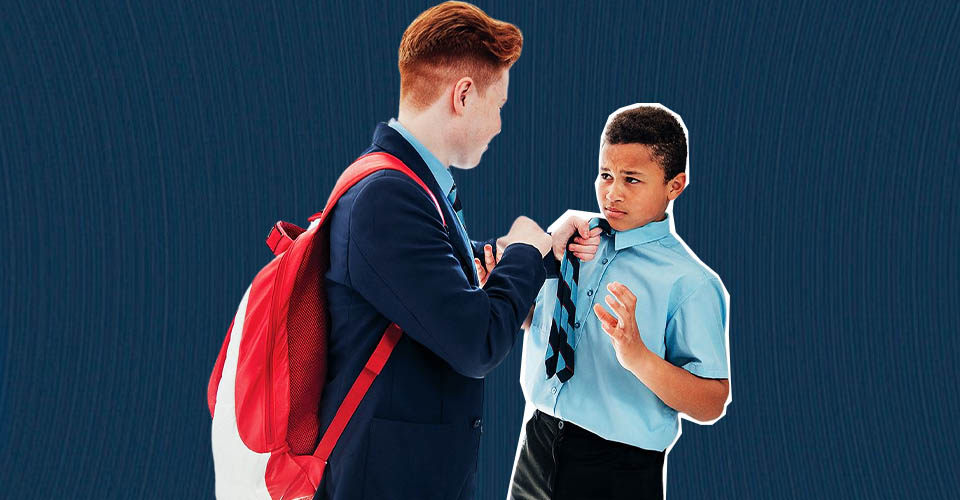Bullying is a sad truth that a lot of kids experience at school. It’s our job as parents to help them and keep them safe.
When your child is being bullied, it can take a huge emotional toll on both of you, and acting quickly and effectively becomes very important.
This article will provide you with actionable advice and tactics to get through this tough situation and also help to understand how to talk to your child about bullying. Below are seven useful tips for when your child is being bullied at school.
What To Do When Your Child Is Being Bullied At School
Bullying is a heartbreaking reality that many children face at school.

As parents, it’s our duty to support and protect our kids, ensuring they feel safe and valued. If your child is being bullied, it’s crucial to take immediate and effective action.
Here’s what to do when your child is being bullied at school.
1. Identify Warning Signs
However, sometimes children don’t say a word about their hardships especially when your child is being bullied at school. Your child might suddenly declare that he/she wants to stay at home and may have anxiety when leaving.
Frequent headaches and stomach pains or other inexplicable physical complaints can be reactions to stress. Look for signs of depression, listlessness or lack of enthusiasm for activities they used to enjoy.
2. Encouraging Open Communication
It is important that you create an environment where your young one feels safe enough to express their emotions. Allow your child the opportunity to share what they went through undisturbedly. Show sympathy and understanding.
Let them talk about how their day was like including any peer interactions.
Avoid questions that direct towards specific answers when your child is being bullied. Make the child feel that he/she is not alone, or guilty in it all; tell them you are there for support.
3. Document The Bullying
Note down all incidents of bullying in a detailed way. Record dates, times, places involved as well as any witnesses present during such an occurrence(s). This information will be useful in dealing with the problem at school level.
4. Partner With The School
Collaborative school efforts can deal with the problem effectively by: Setting up a meeting between your kid’s teacher(s), school counselor(s) or principal(s).

Hand out copies of your records and mention what makes you fear most when your child is being bullied at school.
Developing an action plan with administrators on ending bullying is also necessary which might involve enhanced supervision, counseling or conflict resolution programs etcetera.
It’s important then to regularly follow up on this with the school until measures agreed upon are put into place and are effective enough.
Read More: Why Is Parent Engagement In Schools Important? 10 Hacks For Busy Parents
5. Let Your Child Have Power
Teaching your child how to cope with situations when your child is being bullied can build up their self-esteem and ability to bounce back. Urge your kid to be firm and confident in their own rights. It is test time.
Get the kid into rewarding activities that they are good at. Good experiences boost their worthiness. Encourage a widened social circle of friends out of school through extracurricular activities or community groups.
6. Look For Professional Help
You may need therapy for your child if they have been really wounded by the bullying both mentally and emotionally. There he will find a safe place for his deepest emotions, enabling him to become stronger against blows of life over which he has no control.
7. Keep Engaged
You should always be part of your children’s lives every day without fail: keep on asking about their day, how was school, did you go outside?
This is vital when your child is being bullied as it helps them overcome such circumstances better than alone while being loved by you.
Read More: 5 Positive Effects of Father Engagement on Child Development
How To Talk To Your Child About Bullying
Learning how to talk to your child about bullying can be a delicate task, but it’s essential for their emotional well-being and safety.

Open communication helps when your child is being bullied at school or at outside settings.
Here’s a guide to help you approach how to talk to your child about bullying effectively.
1. Establishing an Open and Secure Environment
For bullying, your child should be able to talk about these issues in an environment that is safe and trustworthy.
When you are free of disruptions, set apart some private time for you two during a quiet period. Sometimes simply avoid interrupting while maintaining eye contact and actively listening can show your child that you are actually participating in the dialogue.
Let your young one understand his or her feelings matter and you are always there to back them up whatever happens.
2. Starting the Conversation
To start at all is important even though it might seem hard especially when you don’t know how to talk to your child about bullying.
Encourage your child to open up more by asking questions when your child is being bullied like, “How was your day?” or “Can you tell me about your friends at school?”
Sharing personal stories or hypothetical situations involving bullying sometimes helps a child express his or herself better concerning his/her own experiences.
3. Listen and Validate
As soon as the child starts sharing, make sure he/she feels listened to and acknowledged. Let him/her know that feeling upset, afraid or angry is normal. Saying things like “I get how much difficult this must be for you” may also have a soothing effect on such students.
Do not just rush with solutions immediately when your child is being bullied; instead allow the kid to first of all talk out their thoughts and emotions exhaustively before moving into what could be done next.
4. Offer Reassurance
Your child must know they are not alone in their experience and that it is not their fault they were targeted by bullies.
Inform them that both the school administration and you have a responsibility of caring for them. Also expound on what steps you can take together towards addressing the matter.
Always remind him/her of those qualities which make him/her special. This will counterbalance any impact of building self-esteem in relation to other children since bullies usually select victims who seem weakly so as to feel superior.
5. Discuss Coping Strategies
Equip your kid with practical ways of handling situations when your child is being bullied at school. Teach your child how to stand up for themselves in a calm and confident manner. They could try role-playing as an exercise.
Let them be aware of who they can turn to when they need support, whether it’s their friends, the teachers or school counselors.
Encourage them to pursue hobbies and activities that they enjoy doing because this will boost their self-esteem and resilience.
Read More: Talking About Mental Illness With Kids: 10 Helpful Tips For Caregivers!
How Does Bullying Affect Child Development
Understanding the various ways bullying affects a child’s physical, emotional, and social growth is crucial for parents, educators, and caregivers.

Here’s a comprehensive look at how does bullying affect child development and what we can do to mitigate these effects.
1. Emotional and Psychological Effects
Bullying can leave a child with deep emotional wounds that mess up his or her mental health. Increased anxiety and depression are common for victims of bullying among children. Such emotions may continue throughout adulthood in case they are not addressed.
When your child is being bullied at school or during their teenage years can result in negative self-image. Children might grow to believe the negative remarks and maltreatment meted out to them leading to permanent low self-esteem.
Sometimes, bullying can cause PTSD. Flashbacks, nightmares, and severe anxiety over their experiences are some of the impacts of how does bullying affect child development.
2. Academic Impact
Stress and distraction as a result of bulling becomes an obstacle to child’s concentration in school leading to lack of success in class work. Bullying is often related to poor academic performance. Concentration on studies may be hard for kids thus lowering the grades.
There are some children who might want to stay away from what is causing them distress like bunking school. When your child is being bullied it can lead to chronic absenteeism which would greatly affect their educational progress.
Thus, it impacts negatively on a child’s enthusiasm for learning while participating in activities within the school setting thereby affecting furtherance of their education.
3. Social Consequences
The interactions and relationships between children change significantly as a result of bullying, having big impact on social development of kids. Trusting others can be difficult for children who have suffered from bullying; hence they find it hard making healthy friends.
They may become withdrawn or isolated themselves. Some children who have been bullied may react by becoming aggressive themselves while some other children may become overly passive because they struggle with trying to assert themselves when interacting socially.
Oftentimes when your child is being bullied, these students are abandoned by their friends which further isolates them consequently hampering their social skills development.
We can play our part by learning how does bullying affect child development and make sure that environments where this act occurs have healthier conditions for growth & development.
Children facing the challenge of being bullied need us together we ensure that we make a difference in their lives.
Read More: What Is Child Development? Understanding the 5 Crucial Stages of Child Development
A Word From Mind Family
Addressing and mitigating the impacts of bullying is crucial for the healthy development of our children. At Mind Family, we understand the importance of proactive and compassionate responses when your child is being bullied at school.
By recognizing the signs, fostering open communication, empowering our children, and working closely with schools and professionals, we can help create a safe and supportive environment for our kids.
Remember, we are all in this together. Let’s continue to support each other and our children, ensuring they grow up feeling valued, confident, and resilient.
Frequently Asked Questions (FAQs)
1. How can I tell if my child is being bullied?
Watch for signs like anxiety, frequent headaches or stomachaches, depression, and withdrawal from activities they once enjoyed.
2. What to do when your child is being bullied at school?
Recognize warning signs, encourage open communication, document incidents, partner with the school, empower your child, seek professional help, and stay involved.
3. How to talk to your child about bullying?
Create a safe environment, start the conversation gently, listen actively, validate their feelings, reassure them, and discuss coping strategies.
4. How does bullying affect child development?
Bullying impacts emotional well-being, academic performance, social skills, and can lead to long-term mental health issues and trust difficulties.














Leave a Reply